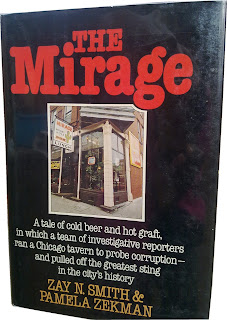By Dennis D. Muhumuza
In Summary:It’s a real-life book every Ugandan journalist should read to learn a thing or two about exposing societal rot.
In Summary:It’s a real-life book every Ugandan journalist should read to learn a thing or two about exposing societal rot.
Imagine a bunch of reporters opening a swanky bar targeting city authorities so they can eavesdrop and expose their excesses! In a small city like Kampala, it would be easy to burst the ruse seeing that almost everybody knows everybody. But in a place as vast as Chicago in the United States, the scribes pulled it off, and that’s what The Mirage is all about.
It’s February 1976 when Chicago Sun-Times Editor James Hodge asks reporter Pamela Zekman if she has any investigative projects in mind. Zekman has heard about the massive corruption that small-business owners have suffered and has long wanted to expose it first-hand.
“We’re always getting complaints about the shakedowns, and payoffs in this city…” she tells her boss. “If we owned a tavern, we could be there when it happened. We could see how the system actually works. We could photograph it; get down on paper once and for all…”
Social corners
Though costly, the idea is irresistible. Bars are where people tippled and discussed life in the big city. “There was no telling what a newspaper might discover if it owned a tavern for a few months. It was the chance to lay open the system, document it. Photograph it. Maybe even help reform it.”
So when the ‘Mirage Watering Hole and Pub’ is open, the Chicago Sun-Times is in business! Its journalists are the bartenders. Even the repairmen are “photographers headed for a hidden loft.” But can they sustain their cover before their sensational story breaks? As “Chicago was the city of the Front Page, everybody was on the lookout for good stories to steal. And the smallest slip –a bit of gossip, a lost memorandum, an overheard conversation, a misdirected telephone call –could easily wreck months of effort.”
In 255 pages, the authors Zay N. Smith (‘Norty the Bartender’) & Pamela Zekman (‘Pam the Barmaid’) tell about their novel experience. They are so determined to succeed that Norty joins a ‘professional bartenders school’ where the curriculum included five days of intensive “mixology”. He learns recipes for more than 85 drinks, attends lectures on wine history, and the basic rules of customer service, which include among others, to stand back when there is a fight so you won’t get sued. He even learns about hidden tricks: “bartender tax fraud, shakedown etiquette, routine thievery, insurance cheating, fraudulent advertisement, and short pours for unsuspecting customers plus “short-shotting the customer” i.e. giving him less liquor in his mixed drink than he paid for.
In this hilarious account, you get to meet Mr Fixit (Phillip J. Berasch), “an established Chicago corruption broker, thriving on a package deal of tax fraud and fixes. He revels in teaching his clients how the system works, “This is how it works. Everybody knocks it down. Everybody chisels it down…they slice it off so they won’t have to pay their sales tax and federal tax…” he likes to say.
Hunting down corruption
It’s also not long before the investigators find out that “in Chicago they didn’t have to look for corruption, corruption looked for them. City inspectors examining the bar’s unashamed violations of health, fire and safety standards were always eager to work things out unofficially “for a small fee”.
Firemen would come into the Mirage selling tickets to golf tournaments when they should have been on active duty in the city that has the highest rate of death by fire in America. Accountants openly bragged about their ability to skim as much as 70 per cent off the top of the profits without the government noticing.”
They also learn through scores of interviews that “tavern tax fraud wasn’t a sometime thing, limited to an occasioned Mr Fixit. It was a regular trick of the trade –a felony that had become a tradition. Everybody kept saying that everybody did it. The big skim was costing the state tens of millions of dollars.”
When the Sun-Times serialises the mind-boggling discoveries, the city is electrified. The “matchless journalistic sting was a scandal that shook the municipal government; an exposé that gained world attention, and, now, one of the most entertaining books that serious reporting has ever produced.”
--Sunday Monitor, May 20, 2012


